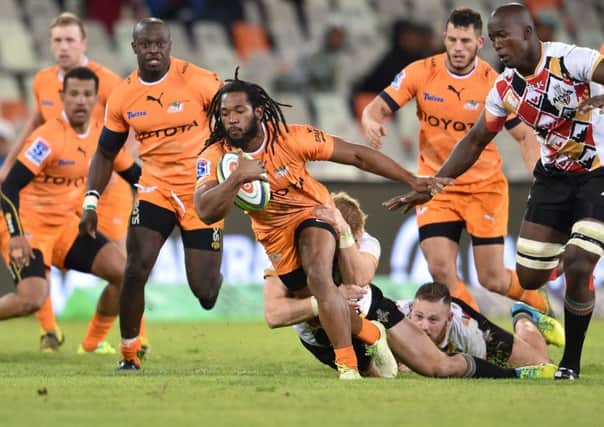Pro14 goes long-haul to welcome South Africans


It has been known for a while that this was coming and many of the details were well trailed, such as the inclusion of former Super Rugby sides the Cheetahs and Southern Kings in a two conferences of seven teams format, but getting your mind around the full details of how this new trans-hemispheric championship will play out proves a rather head-spinning experience.
The fixture list, or at least the first tranche of it, will not be out until next week. Presumably because Professor Stephen Hawking is still working on it!
Advertisement
Hide AdAdvertisement
Hide AdThe revamp takes what started as the Scottish-Welsh league in 1999 into a similar set-up to many US sports and Super Rugby, which has been cut from 18 to 15 and seen the Cheetahs and Kings jump ship.
Glasgow have been picked in the same conference as the Bloemfontein-based Cheetahs, while Edinburgh are in with the Kings. There are to be three Scottish derbies in the regular season.
As for how it will all work…here goes.
Each conference will be made up of two Welsh and two Irish teams, with one representative each from Scotland, Italy and South Africa.
The groups have been based on last season’s results, with the Ospreys, Cardiff Blues, Munster, Connacht, Glasgow, Zebre and the Cheetahs in Conference A.
Last season’s champions Scarlets, Dragons, Leinster, Ulster, Edinburgh, Treviso and the Southern Kings will line up in Conference B.
Teams will play each other home and away in their own section and face sides out of their own conference once.
The 21-game season will be completed by two additional rounds of matches, ensuring Welsh and Irish teams retain their current six derbies each. The Scottish, Italian and South African sides will play each other three times.
The time difference between the UK and South Africa is only an hour and the Cheetahs and the Southern Kings will play only on Saturdays. There will be five travel-free days before matches, while the South African franchises will not be able to qualify for Europe through their league placing.
Advertisement
Hide AdAdvertisement
Hide AdIn some cases, Celtic and Italian teams will play both the South African sides back-to-back on a “mini tour”. Where the fixture list does not accommodate that, long-haul trips to the southern hemisphere will be kept as far apart as possible.
The top three non-South-African sides from each conference will qualify for the European Champions Cup, and the team with the highest points total outside of those six teams across both conferences will claim the final Champions Cup place. The top side from each conference will advance to the semi-finals.
Teams placed second and third in each conference play each other to determine the other two semi-finalists. The play-offs will work over a three-week period after the regular season has been completed.
The introduction of new South African opposition for Glasgow and Edinburgh has been billed as a “great day for Scottish rugby”.
The Scottish Rugby Union said it was “instrumental” in bringing in the South Africans. An SRU statement read: “The ambition is to create the world’s top club competition and today’s announcement is a significant step in that direction.”
Chief operating officer Dominic McKay, pictured, added in a video interview: “We have got the derbies between Glasgow and Edinburgh and they are retained. That rivalry will be continued and I think expanded. But we have also got access to a really important and vibrant market in South Africa. With the growth of television and sponsorship, we see that being very beneficial for Glasgow Warriors and Edinburgh Rugby.
“There’s no doubt both clubs will want to capitalise on those commercial opportunities, which then means they can filter that growth of revenues back into the playing side and hopefully attract and retain, as we have done in recent years, the best talent.
“So it’s a great day for Scottish rugby, which has been at the forefront of leading this expansion, but more importantly we think it’s a great opportunity for our fans, existing sponsors and broadcasters to be really excited about two southern hemisphere teams joining an exciting competition.”
Advertisement
Hide AdAdvertisement
Hide AdPro14 chief executive Martin Anayi added: “This is a natural evolution for the Championship... and we aim to be at the forefront of the game’s growth around the world.
“South Africa is a rugby powerhouse of over 55 million people. These teams already operate to the high standards demanded by Super Rugby and they will add to the quality of our tournament.”
The development is certainly a bold one and may yet lead to further expansion, possibly with more South African sides or into North America. It will all take a bit of getting used to and there could be an accusation that some sporting integrity has been compromised. Despite best efforts it is likely one conference will unfold as a weaker one than the other, handing teams an unfair advantage. One thing is for sure, though, interesting times lie ahead.